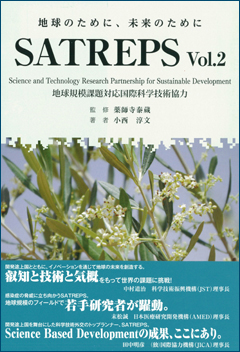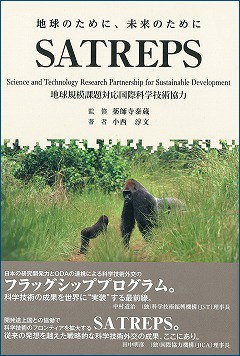IDJ-ENGLISH-Key to the Sustainable Development of the Indo-Pacific
Editorial Report Point of View
Commencement of “The United Nations Decade of Ocean Science”
Key to the Sustainable Development of the Indo-Pacific
Dr. Atsushi Sunami,President, The Sasakawa Peace Foundation
“The United Nations Decade of Ocean Science for Sustainable Development '', which was declared at the UN General Assembly in 2017, started this year. Until 2030, the development of observation networks and the promotion of scientific research necessary to achieve the Sustainable Development Goals (SDGs) will be promoted under the leadership of the Intergovernmental Oceanographic Commission (IOC) of the United Nations Educational, Scientific and Cultural Organization (UNESCO). How will Japan's science and technology diplomacy develop? Dr. Atsushi Sunami, Editorial Board Member of the International Development Journal, shares his views.
Expectations toward Japan's Leadership
The UN Decade of Ocean Science was proposed by the UNESCO-IOC to the UN General Assembly based on the recognition that it is essential to focus on research in oceans that still have many unknowns left behind in the realization of SDG14 (oceans) and SDG13 (response to climate change). In order to advance observation and research, the viewpoint of ocean policy, which includes knowledge about social science, is also indispensable in terms of social implementation that connects results to the SDGs.
In addition, issues related to the UN Framework Convention on Climate Change and the Convention on Biological Diversity, as well as discussions on marine genetic resources and marine reserve areas at the UN Intergovernmental Conference on the preservation and sustainable use of the Biodiversity of Areas Beyond National Jurisdiction (BBNJ), and even the issue of marine plastic litter, require the enhancement of solid scientific knowledge based on natural scientific research. At the same time, in the development of concrete measures, on top of research on maritime policy, solutions from the perspective of science, technology and innovation (STI) are also necessary.
In Japan, a maritime based and science- and technology-oriented country, the promotion of such ocean science is an important issue that is the foundation of maritime policy, and is directly linked to the development of Japan's science and technology diplomacy. In particular, in February, 2021, a National Committee was established to promote our contribution to the UN Decade of Ocean Science, as Japan is expected to demonstrate its leadership in science and technology diplomacy. This committee, co-chaired by Shigeki Sakamoto, a Chairman of the Japan Society of Ocean Policy, and I, are expected to substantially take on the role of science and technology diplomacy centered around ocean science in cooperation with similar committees in other countries.
U.S. also plays a more active role in science and technology diplomacy
As mentioned above, Japan is currently required to maintain its presence in the international community by using science and technology diplomacy as an important tool for diplomacy, to help solve global issues, work with allies, and in responding to the security environment. By the same token, active development of such science and technology diplomacy is also being seen in other advanced countries.
In particular, the US Biden Administration has been actively engaged in diplomacy, with former Secretary of State, John Kerry, as its special envoy, making global warming countermeasures one of its top issues, and the US has also actively cooperated with China, which is competing for hegemony. Jane Lubchenco, a former director of the National Oceanic and Atmospheric Administration who was appointed head of climate change action at the Office of Science, Technology and Policy (OSTP), the Biden administration's science and technology control tower, is a prominent ocean scientist. This also shows how important ocean science is to the Biden Administration.
Furthermore, in the future, competition will emerge between each country as they compete for leadership toward the target of "zero emissions". Under such circumstances, the STI for SDGs, which Japan has led at the UN, with the aim of contributing to global issues, will be more necessary than ever, especially the promotion and utilization of ocean science.
The use of technology in marine waste and Arctic policy
The promotion and utilization of ocean science is particularly expected for solutions to the problem of marine plastic waste. “The Marine Plastic Litter Countermeasures Action Plan" formulated by the Japanese government ahead of the "Osaka Blue Ocean Vision" at the G20 Osaka Summit in June, 2019, also provided a description of science and technology.
In order to realize a "world that does not create new pollution," the contribution from science and technology has been shown, including recognition of the actual situation, enhancing scientific knowledge, developing materials that have less impact even if they flow into theoceans, and promoting innovation. In addition, the Action Plan mentions the contribution to the effective prevention of the outflow of marine plastic waste in developing countries and other countries. It also aims to link science and technology initiatives to the development of science and technology diplomacy.
Expectations are also high for Arctic policy. The Ministry of Education, Culture, Sports, Science and Technology (MEXT) has been promoting “The Arctic Challenge for Sustainability Project (ArCS)“ since 2015, and “ArCSⅡ” since 2020, with plans to hold the third Arctic Science Ministers' Meeting in Tokyo in 2021. Through this meeting, Japan's leadership in solving policy issues in the Arctic Ocean from the scientific and technological side is anticipated. In addition, contributions to the "Zero Greenhouse Gas Emission nets by 2050", which Prime Minister, Yoshihide Suga, expressed in October, 2020, is also expected to propose mitigation measures from the perspective of ocean science such as blue carbon.
Expanding collaboration with the U.S., Australia and India
Ocean science as a form of science and technology diplomacy also plays an important role in the "Free and Open Indo-Pacific" (FOIP). It is significant to collaborate in the field of ocean science in the Quad cooperation between Japan, the U.S., Australia and India. Japan, the U.S. and Australia have already cooperated in the field of observation, and it is important to further expand the quality and scale of this research in the future, as well as to advance cooperation with India.
In the stable development of the Indo-Pacific Ocean, understanding the ocean situation using satellites as a collaboration between marine science and space technology will contribute not only to security, but also to disaster prevention and the eradication of “illegal, unreported and unregulated (IUU) fisheries”. Similarly, cooperation with the Association of Southeast Asian Nations (ASEAN), particularly in the maritime field, including the promotion of a blue economy with Indonesia, will have a significant impact.
On the other hand, cooperation with Pacific island nations, which have a significant influence in international public opinion on the oceans, is an important diplomatic issue for Japan. Palau, for example, will host an international conference called "Our Ocean" created by U.S. Envoy John Kerry during his time as a Secretary of State, this year for the first time in the island nation. With this background, cooperation in the field of ocean science is expected to have a significant impact at the 9th Pacific Islands Leaders Meeting (PALM9) to be held this year.
In combating climate change, it is important for Japan to actively promote dialogue with China in promoting ocean science, as the U.S. and China have agreed to cooperate with each other. There is already a bilateral agreement on marine plastic waste between Japan and China. I think it significant that ocean science will lead Japan-China science and technology cooperation, on the foundation of *Sino-Japanese cooperation that has been built up so far.
The Basic Act on Ocean Policy, enacted in 2007 as a response to the Convention on the Law of the Sea, states in Article 4 (Enhancement of Scientific Knowledge on the Oceans) that "in view of the many fields in which the oceans are not scientifically understood, scientific knowledge on the oceans must be enhanced."
In response to new international issues, such as the marine plastic waste and the Arctic environment, Japan's science and technology leadership is expected. It is possible to lead the international community while maintaining Japan's international position in science and technology in the marine field. Japan, a maritime nation and science and technology nation, will play a leading role in the success of “the UN Decade of Ocean Science”, which will also greatly contribute to the further development of science and technology diplomacy, an important pillar of Japanese diplomacy.
“International Development Journal”, June edition, 2021
*****以下、日本語原文*****
視点 国際開発ジャーナル 論説委員
始動した「国連海洋科学の10年」
インド太平洋の安定的発展のカギに
論説委員 角南 篤 (公財)笹川平和財団 理事長
2017年の国連総会で宣言された「持続可能な開発のための国連海洋科学の10年」が、今年から始まった。これにより30年まで、持続可能な開発目標(SDGs)の達成に必要な観測網の整備や科学研究の推進が、国連教育科学文化機関(UNESCO)の政府間海洋学委員会(IOC)などの主導の下で進められることになる。そうした中で日本の科学技術外交はどう展開されていくのか。本誌論説委員の角南篤氏が展望する。
日本のリーダーシップに期待
「国連海洋科学の10年」は、SDG14(海洋)やSDG13(気候変動への対応)などの実現にはいまだ未知の部分が多く残されている海洋について特に力を注いで研究を推進することが不可欠であるとの認識に基づき、UNESCO-IOCが国連総会に提案したものである。観測や研究を進める上では、成果をSDGsに結び付ける社会実装において、社会科学の知見も加えた海洋政策の視点も不可欠となってくる。
また、国連気候変動枠組条約や生物多様性条約に関する課題、それに関連して国家管轄権外区域の生物多様性(BBNJ)の保全と持続的な利用に関する国連の政府間会議での海洋遺伝資源や海洋保護区をめぐる議論、さらには海洋プラスチックごみ問題でも、それぞれ自然科学的研究に基づく確かな科学的知見の充実が必要となる。同時に、具体的な施策展開にあたっては、海洋政策に関する研究に加えて、科学技術イノベーション(STI)の観点からの解決策も求められる。
海洋立国および科学技術立国を標榜する日本において、このような海洋科学の推進は海洋政策の基盤となる重要課題であり、我が国の科学技術外交の展開にも直結する。とりわけ科学技術外交の側面では日本のリーダーシップを示すことが期待されていることから、我が国では2021年2月、国連海洋科学の10年への貢献を図る国内委員会が設置された。この委員会は、日本海洋政策学会の坂元茂樹会長と筆者が共同委員長を務め、他国にある同様の委員会と連携しながら、海洋科学を中心とした科学技術外交を実質的に担うことが期待されている。
米国でも科学技術外交が活発化
先述のとおり、現在我が国は、科学技術外交により地球規模課題の解決や同盟国との連携、安全保障環境への対応など、科学技術を外交の重要なツールとして国際社会で存在感を維持していくことが求められている。他方、こうした科学技術外交の積極的な展開は他の先進国でも見られている。
とりわけ米国のジョー・バイデン政権は、ジョン・ケリー元国務長官を特使として地球温暖化対策を最重要課題の一つに据え、精力的な外交を展開しており、覇権争いをしている中国ともこの問題については積極的に協力姿勢を示している。また、バイデン政権の科学技術の司令塔である大統領府科学技術政策局(OSTP)で、気候変動対策の責任者に任命されたジェーン・ルブチェンコ元海洋大気庁長官は、著名な海洋科学者であり、このことからもバイデン政権がいかに海洋科学を重要視しているかが読み取れる。
さらには今後、「ゼロエミッション」をターゲットに各国が指導権争いにしのぎを削る姿が視野に入る。そうした中で、我が国が国連でもリードしてきたSTIによる地球規模課題への貢献を目指すSTI for SDGs、とりわけ海洋科学の推進と利活用はこれまで以上に求められるようになるだろう。
海ごみ、北極政策で進む技術活用
海洋科学の推進と利活用で特に期待が大きいのが、海洋プラスチックごみ問題だ。2019年6月のG20大阪サミットにおける「大阪ブルー・オーシャン・ビジョン」に先立って日本政府で策定された「海洋プラスチックごみ対策アクションプラン」でも、科学技術に関する記述が見られる。すなわち、「新たな汚染を生み出さない世界」の実現を向けて、基盤となる実態把握や科学的知見の充実、海洋に流出しても影響の少ない素材の開発、イノベーションの促進など、科学技術からの貢献が示されている。加えて、開発途上国などにおける海洋プラスチックごみの効果的な流出防止への貢献などもアクションプランは言及しており、この問題への科学技術の取り組みを科学技術外交の展開へとつなげることも目指されている。
このほか、北極政策においても期待は大きい。文部科学省は2015年から北極域研究推進プロジェクト(ArCS、20年からはArCSⅡ)を推進しており、21年には東京で第3回北極科学大臣会合の開催も予定している。この会合を通して、北極海における政策課題への科学技術面からの解決に向けた日本のリーダーシップが期待されているのだ。また、20年10月に菅義偉総理大臣が所信表明演説で示した「50年までの温室効果ガス排出ネットゼロ」への貢献についても、ブルーカーボンなど海洋科学からの緩和策の提案が期待されている。
米豪印との協働拡充を
科学技術外交としての海洋科学は、「自由で開かれたインド太平洋」(FOIP)においても重要な役割を担っている。Quadと呼ばれる日米豪印の連携に、海洋科学分野で協働することは大きな意味がある。すでに日米、日豪では観測分野などで協力してきた実績があり、今後は質と規模をより拡充すると同時に、インドとの連携も進めることが肝要になる。
インド太平洋の安定的発展においては、海洋科学と宇宙技術の連携として衛星を活用した海洋状況把握は、安全保障のみならず、防災や違法・無報告・無規制(IUU)漁業の撲滅などにも貢献する。同様に、東南アジア諸国連合(ASEAN)との連携、とりわけインドネシアとのブルーエコノミーの推進をはじめとした海洋分野におけるパートナーシップも、大きなインパクトを持つ。
他方、海洋に関する国際世論で大きな影響力を持つ太平洋島嶼(しょ)国との協働は、我が国の重要な外交課題である。例えばパラオは、米国のケリー特使が国務長官時代に作った「Our Ocean」という国際会議を、今年、島嶼国では初めてホストする。こうした背景からも、今年開催される第9回太平洋・島サミット(PALM9)では海洋科学分野での協力には大きな意味を持つと考えられる。
気候変動対策では、米中も協力することで合意しているように、我が国も海洋科学の推進において、中国との対話も積極的に進めることが肝要である。すでに日中では海洋プラスチックごみに関する二国間合意もあり、これまで培ってきた日中協力の土台の上に海洋科学分野での協同も加え、日中の科学技術協力を海洋科学がけん引することも十分意義があると考える。
海洋法条約への日本の対応として2007年に制定された「海洋基本法」では、その第4条(海洋に関する科学的知見の充実)にて「海洋については科学的に解明されていない分野が多いことに鑑みて、海洋に関する科学的知見の充実が図られなければならない」と示されている。海洋プラスチックごみ問題や北極環境の問題などの新たな国際的な課題に対して、日本の科学技術によるリーダーシップが期待される中、海洋分野においては日本の科学技術の国際的地位を維持しつつ、国際社会を主導していける可能性がある。海洋立国であり、科学技術立国である日本が、国連海洋科学の10年を成功させるために主導的役割を果たすことは、日本外交の重要な柱である科学技術外交のさらなる展開にも大きく貢献するものである。
『国際開発ジャーナル』2021年6月号掲載記事




国会議事堂202004.jpg)
